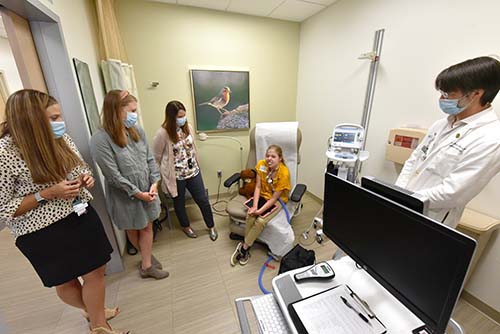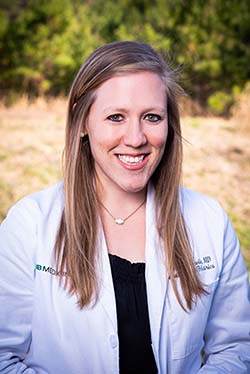 Advancements in the care and treatment of complex childhood medical conditions, such as cerebral palsy, spina bifida, and sickle cell disease, have made it possible for individuals with these conditions to live well into adulthood. As these patients age from adolescence to adulthood, they must transition their medical care to an adult care team. But for many, this transition can bring new challenges. The University of Alabama at Birmingham and Children’s of Alabama have partnered to create the Staging Transition for Every Patient (STEP) Program to help these patients face any challenges or barriers as they transition their care.
Advancements in the care and treatment of complex childhood medical conditions, such as cerebral palsy, spina bifida, and sickle cell disease, have made it possible for individuals with these conditions to live well into adulthood. As these patients age from adolescence to adulthood, they must transition their medical care to an adult care team. But for many, this transition can bring new challenges. The University of Alabama at Birmingham and Children’s of Alabama have partnered to create the Staging Transition for Every Patient (STEP) Program to help these patients face any challenges or barriers as they transition their care.
“We identified that there was a huge need for a primary care environment that could help pediatric patients who have medically complex pediatric conditions transition to adult care,” explains Carlie Stein, M.D., assistant professor in the Department of Medicine and Department of Pediatrics and medical director for the STEP Program. “We wanted to create a program that could prepare adolescent patients for their transition of care and create a primary care space that could assist these patients with the individualized care and support they need.”
The STEP Program began in September 2020 and was designed to provide support and assistance to patients and their families based on their own individualized need. Patients who are 14 and older at Children’s of Alabama can begin working with the program to prepare for the transition to adult care. During this time, the program team will discuss with the patient and their families the changes associated with moving to an adult care model, including the shift in decision-making and self-care from the parent or caregiver to the patient. They will work to set health care priorities and determine when to transfer to adult care.
For patients who have already aged into adulthood, it is important to match them with primary care physicians who are experienced with complex medical conditions of childhood. In the adult care model, the primary care physician provides a majority of the medical care for patients, referring to subspecialists when necessary. To assist with the transition to the adult care model and to prevent an interruption in care, the STEP Program established a primary care clinic to provide medical care, support services and an individualized transition plan for patients who are 18 or older. The clinic sits in the Whitaker Clinic of UAB Hospital with other adult primary care clinics.
“In the clinic, we provide care for all their medical needs, as well as preventative care, like other primary care clinics but also work to establish a coordinated care plan to ensure they receive uninterrupted expert care,” said Stein. “What sets us apart from other primary care settings is that we have social work and physical therapy embedded in the clinic and work to schedule any subspecialists or additional services that are unique to our patient’s needs.”
 Carlie Stein, M.D.The goal of the STEP Clinic is to provide patients with all their care needs in one primary care setting. During clinic visits, the program team works with the patient to provide any care, services, or resources they may need including social workers, physical therapists, nutritionists, and counselors.
Carlie Stein, M.D.The goal of the STEP Clinic is to provide patients with all their care needs in one primary care setting. During clinic visits, the program team works with the patient to provide any care, services, or resources they may need including social workers, physical therapists, nutritionists, and counselors.
“To best serve our patients, we bring a holistic approach to their care,” explains Stein. “We want to help them achieve their future goals and provide them with any resources or services that can help. This may include having them meet with our social workers to make sure there are no insurance issues, coordinating vocational rehab, or ensuring they have accommodations at school and home if necessary.”
The program care team consists of two physicians, Madeline Eckenrode, M.D., and Stein, social workers from UAB and Children’s Rehabilitation Services, and UAB physical therapists. Where necessary the clinic works to identify adult subspecialists who are needed as part of the care team. Betsy Hopson, MSHA, serves as the program director and brings over 20 years of transition care experience to the program.
The STEP Program is the first formal program of its kind in Alabama and the surrounding region.
“Our goal with the STEP Program was to provide care and support for a population that was struggling to find appropriate primary care,” said Stein. “I’m proud of the program that we have been able to build and hope that we are able to grow the program and provide these patients with the medical care and support that they need and deserve.”
